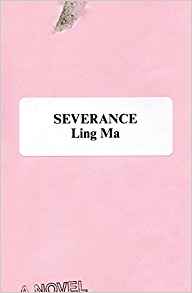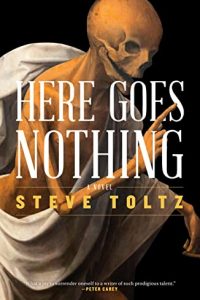Ian Mond Reviews Severance by Ling Ma
 Severance, Ling Ma (Farrar, Straus, Giroux 978-0374261597, $26.00, 304pp, hc) August 2018.
Severance, Ling Ma (Farrar, Straus, Giroux 978-0374261597, $26.00, 304pp, hc) August 2018.
I’ve lost count of how many books I’ve read that involve the flu wiping out most of humanity. The granddaddy of these is undoubtedly Stephen King’s The Stand, but recently we’ve had novels from Emily Mandel (Station Eleven), Meg Elison (The Book of the Unnamed Midwife and its sequels), and Margaret Atwood (The MaddAddam trilogy). You’d have thought there was nothing else to say, that like zombies and vampires, the subgenre was well and truly tapped out. But then along comes Severance by Ling Ma, and you’re reminded that good writers with a story to tell can make the familiar fresh again.
The novel’s prologue introduces us to nine people making their way from New York to Chicago. They are “brand strategists and property lawyers and human resources specialists and personal finance consultants.” They are also survivors of Shen Fever, a fungal infection which originated in China and has brought civilisation to its knees. It’s Bob, the IT guy, who suggests the group head to a two-storey facility located on the outer edge of the Windy City where they will find plenty of food and even a movie theatre. As they make their way across state borders, and as they stop to scavenge for supplies, they come across the fevered, people who have succumbed to the plague, but, like zombies or drones, repeat the same mundane task until their bodies fold under the strain.
This story of the end of the world is told to us by Candace Chen. Before she met Bob and the other white collar survivors, she worked in Manhattan for Spectra, a production firm that coordinated the manufacture of books for major New York publishers. Candace oversaw a team that managed the mass production of Bibles in China, a significant chunk of Spectra’s business. It’s a job Candace fell into, not one she trained for, but one she’s adept at. Her life, though, is tipped on its head not by the Shen Fever but the discovery that she’s pregnant and that her long-term boyfriend has decided to leave New York (he can’t stand the city’s “facade of authenticity”).
What I loved about Severance is how Ling Ma uses the apocalypse to critique late-stage capitalism. Not only is there the strong implication that the fever was born in the sweatshops of China, but the daily grind of capitalism means that this extinction-level event is initially ignored. As Candace observes in the opening lines of the first chapter: “The End begins before you are ever aware of it. It passes as ordinary.” Even when the Shen Fever starts to spread rapidly through the city, Candace, lured by the promise of a huge bonus, agrees to help manage a skeleton staff of Spectra employees to keep the company running. Because Candace stays in New York until the bitter end, we’re afforded the complete arc of a city’s decline, a narrative that’s often compressed or skipped in post-apocalyptic stories. It’s a sobering and terrifying portrait of apathy, of denial, and finally of acceptance. When Candace begins to document the final days of the city – posting the photos she takes on her once-defunct blog “NY Ghost” – she begins to see past the myth of New York, “its glossy, reflective surfaces and moneyed environments.”
Severance isn’t just a takedown of capitalism; it’s also an honest examination of the immigrant experience. Candace’s fraught relationship with her mother – who died shortly before Candace graduated from college – is a direct result of the family’s emigration to America. Candace recalls that when, at the age of six, her parents brought her to the States, her mother was unrecognisable: “disciplinarian, restrictive, prone to angry outbursts…. For most of my childhood and adolescence, my mother was my antagonist.” In what turns out to be the emotional core of the novel, Candace pauses her story – New York, Shen Fever, Bob, and the journey to Chicago – and through the eyes of her parents, especially her mother, details those opening, difficult months in America, the loneliness, the sincere desire to return home, made all the more difficult as her parents watch the tragedy of Tiananmen Square unfold.
Not surprisingly then, the scenes set in the present aren’t nearly as powerful and effective. The journey to the Facility, which sees Bob become more autocratic, has a familiar vibe – every post-apocalyptic novel needs its devout, obsessive, power-hungry leader. But even if these sections seem familiar, the manner in which the group deal with the mindless, zombie-like fevered (an admittedly on-the-nose metaphor for capitalism’s poor treatment of workers) is shocking and upsetting.
Severance‘s originality doesn’t come from its central conceit, but rather from the way Ling Ma uses the apocalypse to tell a thoughtful and moving story about the migrant experience and the last days of capitalism.
This review and more like it in the December 2018 issue of Locus.
 While you are here, please take a moment to support Locus with a one-time or recurring donation. We rely on reader donations to keep the magazine and site going, and would like to keep the site paywall free, but WE NEED YOUR FINANCIAL SUPPORT to continue quality coverage of the science fiction and fantasy field.
While you are here, please take a moment to support Locus with a one-time or recurring donation. We rely on reader donations to keep the magazine and site going, and would like to keep the site paywall free, but WE NEED YOUR FINANCIAL SUPPORT to continue quality coverage of the science fiction and fantasy field.







